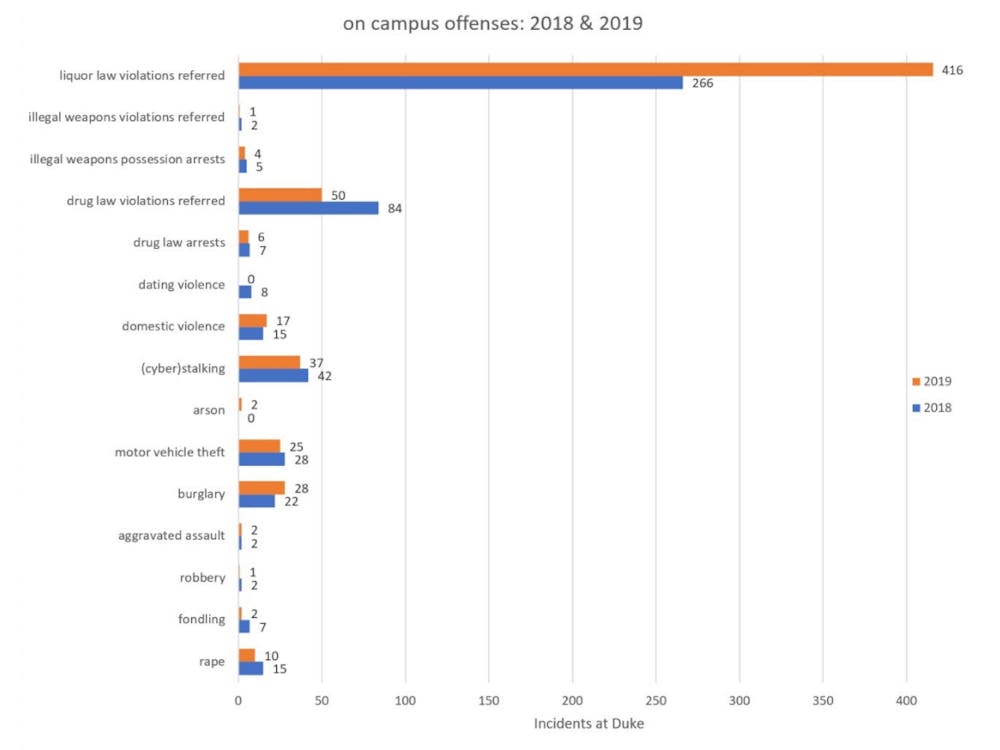Although crimes and Violence Against Women Act reports on campus generally dropped last year, liquor violations saw a spike, according to the 2020 Annual Clery Security Report.
The report—which is categorized by the offense and the year in which it was reported—indicates that the number of reports in 2019 went down in most categories of crime as compared to 2018. Within the same time period, liquor law violations that resulted in a referral for disciplinary action saw a marked increase, jumping from 266 in 2018 to 416 in 2019. Arrests for liquor law violations, however, stayed at zero.
Resident advisors and residential coordinators report the majority of liquor law violations, Kyle Cavanaugh, vice president for administration, wrote in an email.
John Blackshear, dean of students and associate vice president for student affairs and, wrote in an email that the increase is due to variations in incidents that happen each year.
“There were no changes in existing policies or procedures that could be identified as reasons for the changes,” he wrote.
There were 327 liquor law violations that resulted in a referral for disciplinary action in 2017, according to the report.
Conversely to the trend in liquor law violations, the number of drug law violations that were referred for disciplinary action dropped from 84 in 2018 to 50 in 2019. Six drug law violation arrests were made in 2019, one fewer than in 2018.
Four arrests were made in 2019 for possession of illegal weapons, one fewer than in 2018. Only one illegal weapons violation was referred for disciplinary action. None of these reports occurred in residential facilities.
Cavanaugh wrote that crime on campus remains relatively low, making particular note of the technology that has been used to achieve the low rate.
“The safety and security of our campus community remains our highest priority,” he wrote. “...We work continuously with our community to identify opportunities to create a safer environment across Duke. Improved building access controls, the installation of security cameras across campus, and the broad utilization of the LiveSafe Mobile app have been significant enhancements in recent years.”
Robbery went from two cases in 2018 to one in 2019. In the same time period, aggravated assault reports remained at two. Motor vehicle theft also decreased, from 28 cases in 2018 to 25 in 2019.
Reports of rape on campus went down from 15 in 2018 to 10 in 2019. In the same time period, reports of fondling dropped from seven to two.
Violence Against Women Act reports dropped in aggregate as well.
Reports of domestic violence increased from 15 in 2018 to 17 in 2019, but stalking reports dropped from 42 to 37 and no reports of dating violence were made in 2019.
The report identifies only two primary offenses that saw an increase in reports: Burglary and arson. Burglary went from 22 reports in 2018 to 28 in 2019, and reports of arson increased from zero to two.
“There always tends to be some variation in the data year-over-year,” Cavanaugh wrote of the increase. “Our focus continues to be creating a safer environment and ensuring numerous ways for reporting incidents when they do occur so we can respond and provide support as appropriate.”
The report includes the same statistics for the Marine Lab and the Duke in DC program, both of which saw zero reports in every category.
The report includes crime data from the past three years compiled from various sources, including, campus police and security, local law enforcement and University officials.
Get The Chronicle straight to your inbox
Signup for our weekly newsletter. Cancel at any time.

Preetha Ramachandran is a Trinity senior and diversity, equity and inclusion coordinator for The Chronicle's 118th volume. She was previously senior editor for Volume 117.

